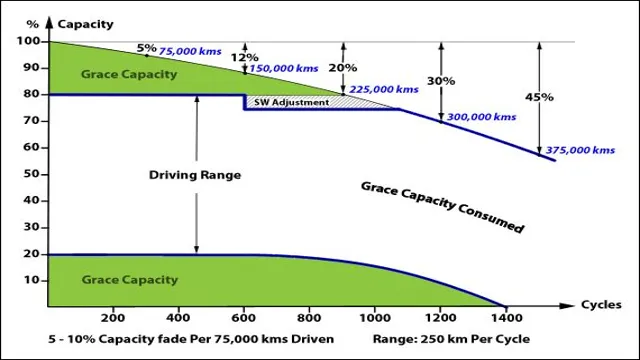Decoding the Lifespan of Electric Car Batteries: Here’s What You Need to Know
With electric cars becoming increasingly popular, many drivers are concerned about the battery life of these vehicles. After all, electric cars rely entirely on their battery to function, so it’s natural to wonder how long they can last before needing to be replaced. But the answer isn’t as straightforward as you might think.
There are a variety of factors that can impact the lifespan of an electric car battery, and understanding these factors is essential for anyone considering purchasing an electric vehicle. In this blog, we’ll dive into the world of electric car battery life and explore some of the key factors that can impact how long your battery will last.
Overview of Electric Car Batteries
The average life of electric car batteries depends on various factors such as the battery’s chemistry, its usage, and maintenance. Typically, lithium-ion batteries used in electric vehicles have a lifespan of around 8-10 years or up to 150,000 miles, whichever comes first. However, this lifespan can vary depending on how frequently the battery is charged and discharged, extreme weather conditions, and how well the battery is maintained.
Proper care and maintenance of the electric car battery can help extend its lifespan. Regular checks and replacements of the battery cells can also help ensure optimal performance. When it is time to replace the battery, it is crucial to dispose of it responsibly and safely.
Battery technology is continuously evolving, and advancements are being made to increase the lifespan of electric car batteries. With proper care and maintenance, electric car batteries can last for many years, making electric vehicles a viable and practical option for the future.
Composition of Electric Car Batteries
Electric car batteries are a complex composition of several components that work together to provide power to the vehicle. The cells are the fundamental building blocks of the battery. Lithium-ion is the most common material used to manufacture electric cars batteries because it is lightweight and has a high energy density.
These cells are typically organized in modules, which are responsible for providing the necessary voltage to power the electric motor. Additionally, electric car batteries have electronic management systems that regulate the charging and discharging process. These systems are crucial since they prevent the battery from overcharging, overheating, or over-discharging, which could significantly reduce the battery’s lifetime.
Besides the aforementioned, other components such as coolant systems, structural support elements, and other auxiliary components complement the electric car battery’s complex composition. Given this, the composition of electric car batteries is undoubtedly an engineering marvel that continues to evolve to meet the current transportation industry’s clean energy requirements.
Factors Affecting Battery Life
Overview of Electric Car Batteries Electric cars are powered by rechargeable batteries that store electrical energy, which is then used to power an electric motor. These batteries are typically made up of multiple individual cells, which are linked together to form a battery pack. The life of an electric car battery depends on several factors, including the type of battery used, the number of cells in the battery pack, and the operating conditions of the vehicle.
For example, factors such as temperatures, charging and discharging frequencies, and driving habits can all have a significant impact on battery life. Lithium-ion batteries are the most commonly used battery type in electric vehicles, due to their high energy density and long life, but they can also be affected by factors such as temperature and charging patterns. While battery technology continues to improve, the overall lifespan of an electric car battery is still a concern for many potential buyers.
However, with proper maintenance and care, most electric car batteries should last for many years of normal use.
Average Life of Electric Car Batteries
When it comes to electric cars, one of the primary concerns for potential buyers is the lifespan of the batteries. So, what is the average life of electric car batteries? Well, it depends on a few factors. The type of battery, how often a person drives their electric car, and how well they maintain the battery can all impact its lifespan.
Generally speaking, most electric car batteries should last anywhere between 8-10 years or around 100,000 miles, whichever comes first. However, some electric car manufacturers are now offering warranties of up to 15 years or 150,000 miles on their battery, which is certainly reassuring for those who prioritize longevity. That being said, like any battery, electric car batteries will eventually degrade over time.
But, with proper care and maintenance, electric car batteries can have a long and healthy lifespan. So, the average life of electric car batteries is certainly nothing to be worried about, particularly if you invest in a reputable electric car brand.
Data on Battery Life Expectancy
Electric car batteries are becoming increasingly popular due to their eco-friendliness and low maintenance costs. However, the average life of electric car batteries is a topic of much debate and concern among potential buyers. As per data analysis, most electric car batteries have a life expectancy of around 8-10 years.
But this can vary depending on several factors such as the type of battery, charging and driving habits, and external factors such as temperature and weather conditions. It is essential to understand that although an electric car battery may lose some of its capacity over the years, it does not necessarily mean that it needs to be replaced. Also, the battery’s maintenance and service history play a crucial role in determining its longevity, and regular check-ups can significantly extend its life.
So, if you take proper care, an electric car battery can last for a long time, giving you a hassle-free and eco-friendly driving experience.
Comparison to Traditional Car Batteries
When it comes to comparing electric car batteries to traditional car batteries, the average life span of the former is a major factor to consider. While traditional car batteries typically last around four years, electric car batteries can last anywhere from eight to ten years. This is due to the fact that electric car batteries are made differently than traditional car batteries.
They are designed to handle frequent charge and discharge cycles, which is necessary for the operation of an electric car. Additionally, electric car batteries are larger and more powerful than traditional car batteries, allowing them to last longer. It’s important to note, however, that the life span of an electric car battery can vary depending on factors such as usage, climate, and maintenance.
But overall, electric car batteries are built to last longer than traditional car batteries.
Impact of Weather and Climate
Electric car batteries are a major component of the green energy movement, and they’ve come a long way in recent years. However, one thing that can greatly impact the average life of an electric car battery is the weather and climate in which it is used. In general, extreme temperatures – hot or cold – can cause the battery to degrade more quickly and reduce its overall lifespan.
Electric car batteries rely on chemical reactions to take place for power, and high temperatures can cause those reactions to occur at a faster rate, leading to faster wear and tear on the battery. Similarly, extremely cold temperatures can slow the reactions down and affect the battery’s ability to hold a charge. This means that if you live in an area with particularly harsh weather conditions, such as extremely high or low temperatures, you may see a faster decline in your battery’s performance and lifespan.
It’s important to keep this in mind when considering purchasing an electric vehicle and to take steps to mitigate the effects of weather on your battery’s lifespan, such as parking in a covered or underground space in extreme temperatures.
Tips to Extend Battery Life
As electric vehicles become more popular, the average life of electric car batteries becomes an essential topic. Here are some tips to extend battery life. Firstly, try to avoid fast charging as much as possible, and instead, use a level 2 charger to charge your vehicle.
This will put less strain on the battery and help it last longer. Secondly, avoid charging the battery to the maximum capacity regularly and try to maintain a charge level between 20% to 80%. Overcharging the battery or leaving it completely discharged for extended periods can lead to fast deterioration.
Lastly, keep the battery temperature in check. Extreme temperatures, either hot or cold, can damage the battery and reduce its lifespan. By following these tips, you can ensure your electric car battery lasts longer, saving you money and reducing waste.
Proper Regimen for Charging
One important aspect of extending the battery life of your electronic devices is to follow a proper charging regimen. First and foremost, it is essential to use the charger that came with your device or one that is recommended by the manufacturer to avoid damaging the battery. It is also essential to avoid overcharging your device, which can lead to a shorter overall battery life.
A good rule of thumb is to unplug your device when it is charged to around 80%, as frequently charging your device to 100% can cause battery degradation over time. Additionally, it is crucial to avoid charging your device in extreme temperatures, such as leaving it in a hot car or charging it in direct sunlight. Overall, following these simple tips can help you maximize the life of your electronic device’s battery and save you money in the long run.
Maintenance and Inspection
When it comes to extending battery life, there are a few tips that you can follow to help prolong the life of your battery. Firstly, ensure that you always charge your battery fully before using it. This will help to prevent the battery from becoming overworked and potentially damaging it.
Secondly, try to avoid leaving your battery plugged in for prolonged periods when it is fully charged. This can lead to the battery becoming overcharged and damage it over time. Additionally, you should avoid exposing your battery to extreme temperatures or storing it in an area that is prone to humidity.
These factors can cause the battery to deteriorate faster, shortening its lifespan. Finally, make sure to inspect your battery regularly for any signs of wear or damage. Catching these issues early can help to prevent more severe damage from occurring and ultimately extend the life of your battery.
By following these tips, you can enjoy a longer battery life and avoid the need for costly replacements.
Conclusion
In conclusion, the average life of electric car batteries is a topic that is both complex and fascinating. These high-tech power sources are designed to last for thousands of charging cycles, delivering unparalleled performance and reliability to drivers around the world. From their humble beginnings as experimental prototypes to the cutting-edge technology we have today, electric car batteries are an essential component of the automotive industry’s eco-friendly future.
So, whether you’re an eco-warrior looking to reduce your carbon footprint, or a tech enthusiast intrigued by the latest innovations, the average life of electric car batteries is a topic worth exploring – and one that promises to have a bright and exciting future ahead.”
FAQs
What is the average life of an electric car battery?
The average life of an electric car battery is typically around 8-10 years. However, this can vary depending on factors such as usage, storage conditions, and maintenance.
How long do electric car batteries last on a single charge?
The range of electric car batteries varies depending on the make and model of the vehicle, as well as driving conditions. However, most electric cars can travel between 100-300 miles on a single charge.
Can electric car batteries be recycled?
Yes, electric car batteries can be recycled. In fact, many manufacturers offer recycling programs for their batteries.
Are electric car batteries more expensive to replace than traditional car batteries?
Yes, electric car batteries are generally more expensive to replace than traditional car batteries. However, electric car batteries last longer, so they may not need replacement as frequently. Additionally, as technology advances, the cost of replacing electric car batteries is expected to decrease.





